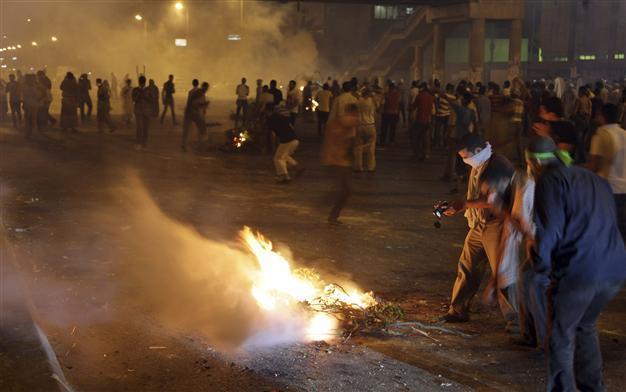Scores killed in pro-Morsi demo in Egypt, as parties give conflicted reports on death toll
CAIRO

Supporters of Egypt's ousted President Mohamed Morsi block the street with burning tree during clashes with riot police at Nasr City, in Cairo, July 26. AP photo
Scores of supporters of ousted President Mohamed Morsi were killed after security forces opened fire on a mass demonstration early on July 27, deepening the turmoil that has convulsed Egypt for weeks.Men in helmets and black police fatigues fired on crowds gathered before dawn on the fringes of a round-the-clock sit-in near a mosque in northeast Cairo, Morsi's Muslim Brotherhood said.
Authorities and medics gave conflicting figures to news agencies and media outlets, though dozens are thought to have been seriously injured after the attack. The Muslim Brotherhood's website said 120 people had been killed and some 4,500 injured, while Egypt's health ministry told AFP that it had only counted 20 dead so far. The ministry later raised the toll to 65.
Brotherhood spokesman Ahmed Aref later said 66 people had been killed and another 61 were "brain dead" on life support machines. More than 4,000 were treated for the effects of tear gas and gunshot or birdshot wounds, he told reporters. "Innocent blood was spilled," he said. "We have gone back 10 years.
For its part, Turkish state agency put the death toll at over 200, citing medics at the Sahra Hospital at Rabaa al-Adawiya Square, where Morsi supporters had been gathered since the military takeover on July 3.
British broadcaster BBC said that based on its own sources over 100 had been killed, while The Guardian put the death toll at 136.
A Reuters reporter counted 36 bodies at one morgue, while health officials said there were a further 21 corpses in two nearby hospitals, but those numbers were dismissed by the Health Ministry.
Meanwhile, Egypt's Interior Minister Mohamed Ibrahim told reporters only 21 had died and denied that police had opened fire, accusing the Brotherhood of exaggerating the event for political ends.
Ibrahim said local residents living close to the Rabaa al-Adawia mosque vigil had clashed with protesters in the early hours after they had blocked off a major road bridge. He said police had used teargas to try to break up the fighting.
Well over 200 people have died in violence since the overthrow of Morsi, including at least nine on July 26, most of them Brotherhood supporters.
Army chief General Abdel Fattah al-Sisi, who played a central role in the overthrow of Mursi following huge demonstrations against his year-long rule, called for Egyptians to rally on July 26 to give him a mandate to tackle "violence and terrorism."
Hundreds of thousands heeded his call, but Muslim Brotherhood supporters also staged mass, counter-rallies, demanding the reinstatement of Mursi, who was placed under investigation on Friday for a raft of crimes, including murder.
Live rounds
Haddad said police started firing repeated rounds of teargas sometime after 3 a.m. at protesters who had spilled out of the main area of the Rabaa sit-in and were on a main thoroughfare close to 6th October Bridge.
"Through the smog of the gas, the bullets started flying," he said. In addition to "special police forces in black uniforms" firing live rounds, he said that snipers shot from the roofs of a university, buildings in the area, and a bridge.
State news agency MENA quoted an unnamed security source as saying that only teargas was used to disperse protesters. He said no firearms were used.
Haddad said the Morsi supporters had used rocks to try to defend themselves. On the podium outside the Rabaa mosque, a speaker urged people to retreat from the gunfire, but "men stayed to defend themselves because women and children are inside the sit-in", he said.
It was the second time this month there had been a mass killing near Rabaa. On July 8, 53 people died when armed men shot into a crowd after morning prayers close to a Republican Guard compound in the area.
"This is much more brutal because the Republican Guard looked like a tactical military operation. This one looks like a much more brutal aggression," Haddad said.
Egypt's army-installed interior minister, Mohamed Ibrahim, said on July 26 that the month-old Cairo vigils by Morsi supporters would be "brought to an end, soon and in a legal manner", state-run al Ahram news website reported.
Sisi's rising star
There is deepening alarm in the West over the army's move against Morsi. The country of 84 million people forms a bridge between the Middle East and North Africa and receives $1.5 billion a year in mainly military aid from Washington.
Fireworks lit up the night sky over Cairo's central Tahrir Square into the early hours of July 27, where army supporters rallied clutching posters of Sisi in full ceremonial uniform.
In a sign of the general's rising star, many of the posters depicted him alongside Gamal Abdel Nasser and Anwar Sadat, former military officers who went on to become presidents.
The investigation into Morsi centres on accusations that he conspired with the Palestinian Islamist group Hamas to escape from jail during the 2011 uprising against veteran autocrat Hosni Mubarak, killing some prisoners and officers, kidnapping soldiers and torching buildings.
Morsi has said local people helped him escape during the upheavals. Hamas challenged investigators to find "one piece of evidence" that it had meddled in Egyptian affairs. The Brotherhood has rejected the allegations as "fantasy".
















